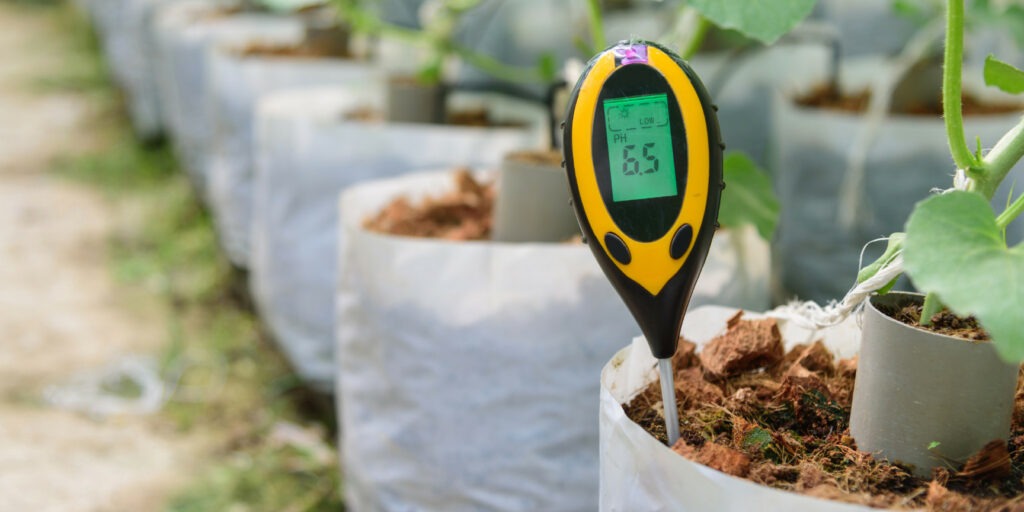Soil testing is vital for assessing soil health, nutrient levels, and pH. The composition of your soil informs what fertilization methods work best and what amendments are necessary for thriving turf. Learning how to test soil pH at home offers a straightforward method to gauge acidity or alkalinity levels. While home test kits are available, many homeowners choose to hire a professional for this service.
How To Test Soil pH at Home
Soil testing is a pivotal practice in turf care, helping evaluate soil quality and composition for optimal plant nourishment. This meticulous process entails analyzing diverse aspects of soil such as:
- pH levels
- nutrient content
- texture
One common testing method is to use a home soil test kit. Conveniently available at major hardware stores, these kits commonly feature vials, or tablets designed to gauge soil properties and come with instructions for interpretation. Alternatively, testing meters offer the convenience of direct insertion into the soil for instantaneous readings.
When learning how to test soil pH at home, remember these basic steps:
- Thoroughly clean the tools you’ll use to collect the soil sample.
- Dig five holes in the planting area, each about 6 to 8 inches deep.
- Take about a half-inch thick slice from the side of each hole and place it in your bucket.
- Collect samples from different areas of the planting space that will be growing similar plants. This ensures you get a good representation of the overall soil composition.
- Mix the soil in your bucket then spread it out on a newspaper to dry. Once it’s dried, gather about a pint of this soil for your sample.
Testing your soil when it’s fairly dry will help give accurate readings. Fall or early spring are considered ideal times for soil analysis, allowing time for adjustments based on pH and nutrient availability before planting. Performing multiple tests helps to verify results and ensure accuracy in your soil management decisions.
By understanding the soil’s composition, you can make informed choices regarding:
- Fertilization
- Soil amendment
- Crop selection
This ultimately optimizes plant health and productivity.
Using a Home Soil Test vs. Hiring a Professional
Whether at home or with a professional, accuracy, expertise, and resources are key considerations when it comes to testing soil pH. This is especially true in a diverse region such as East Tennessee, which is also home to various soil types due to housing developments.
A home soil test seems like a convenient and affordable option that you can pick up at any local hardware store. However, they come with their limitations such as inaccurate readings if soil samples aren’t drawn deep enough or if the soil is too wet. Such inaccuracies could affect decisions regarding soil management, potentially leading to less-than-ideal outcomes.
On the flip side, professional soil testing service offers several advantages. Professionals have the know-how to ensure accurate testing procedures, minimizing the chances of errors. They understand the intricacies of soil composition. Additionally, they have access to specialized equipment and resources for thorough soil analysis.
Working with professionals also means benefiting from their interpretation of test results. They can provide valuable insights into soil health and recommend appropriate actions to replenish soil nutrients or adjust pH levels. With their experience and knowledge, a professional soil tester can tailor soil management plans to suit your specific needs, ultimately improving plant growth.
Get Results with Grover Soil pH Testing in Knoxville
We operate differently at Grover Turf Care in Knoxville. Unlike other professional soil testing services, we don’t just tell you what’s wrong—we show you. We do this by filming and narrating our initial visit. In this video, we point out the issues we see and what needs to be done to reach your goals, as well as best practices that may need to be used.
Soil testing is always part of our initial recommendation. That’s because it’s such a critical first step toward getting the lawn you’ve always wanted. Combined with options for our golf course approach to fertilization and organic turf care options, testing the pH of your soil is the first step toward getting the yard you and your family deserve.

Home soil pH testing at home is vital for turf maintenance, evaluating soil quality, and nutrient composition. Home test kits let you do it on your own. However, hiring professionals is advisable for precision, especially in diverse regions like East Tennessee. They offer expertise, specialized tools, and tailored soil management plans. At Grover Turf Care in Knoxville, we prioritize comprehensive soil testing—essential for achieving optimal lawn health.




